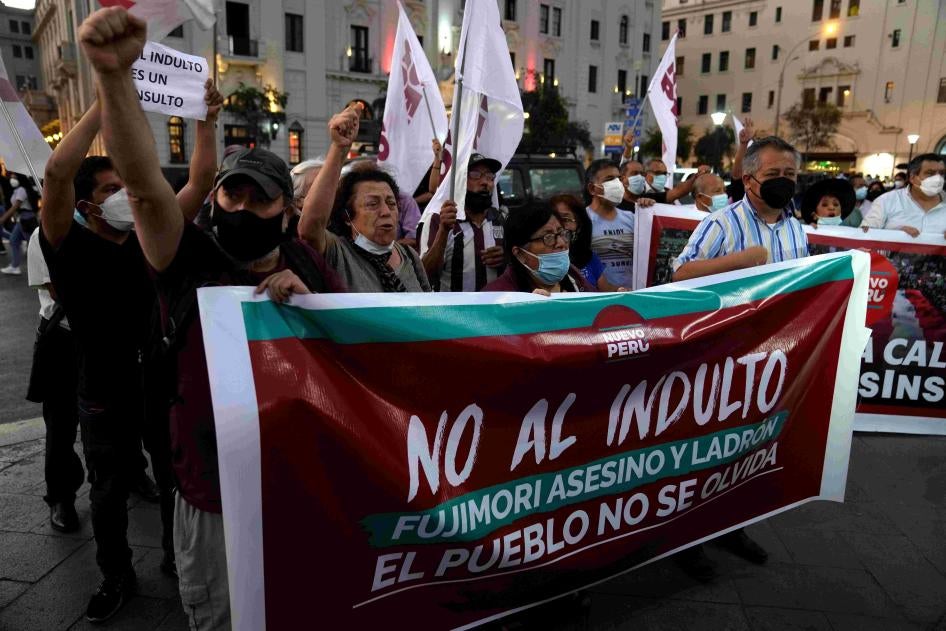Nearly 15 years ago, I proudly stood in a packed Peruvian courtroom witnessing the conviction and sentencing of my country’s autocratic former president, Alberto Fujimori, for crimes against humanity and large-scale corruption offenses that for years allowed him to control all branches of government and much of the media. At the time, I felt hopeful about Peru’s ability to move past his government’s kleptocratic and authoritarian practices.
But today, I’m deeply concerned. Corrupt networks have once again seized powerful positions and are intent on eliminating all checks on them by coopting democratic institutions. A Dec. 4 court ruling ordering Fujimori’s release, effected two days later, appears symptomatic of that trend.
Fujimori was a trailblazer among autocrats in the region. Unlike military dictators in many Latin American countries, he came to power in 1990 through democratic elections. But he became a master at manipulating public opinion and corroding democratic institutions from within. In 1992, he shut down the country’s chaotic Congress and ruled by decree while he had a new constitution written. Much of the public, seeking a way out of a severe economic crisis and escalating armed conflict with the brutal Shining Path insurgency, supported him and voted him back into office in 1995, even after evidence surfaced of government backing for death squad massacres and other human rights abuses.
Meanwhile, Fujimori and his intelligence chief, Vladimiro Montesinos, were quietly undermining the system through bribes and intimidation, changing the rules to perpetuate their power. When the Constitutional Tribunal held that Fujimori couldn’t run for a third consecutive term, his congressional majority simply removed the justices who had ruled against him.
Fujimori’s rule ended in November 2000 after dozens of video recordings came to light showing Montesinos paying huge sums of cash to congress members, heads of news outlets, and others. Fujimori initially distanced himself from the scandal and appointed a special prosecutor to investigate, but it quickly became clear that he would be implicated. During a trip to Japan, Fujimori resigned by fax.
Network of Corruption
The special prosecutors’ team went on to uncover a vast corrupt network, opening cases involving more than 1,500 defendants, and repatriating hundreds of millions of dollars in stolen assets. In 2007, a Chilean court extradited Fujimori to Peru from Chile, making him the first former head of state to be extradited to his own country to face justice for international crimes.
His conviction, in April 2009, sent a powerful message, showing Peruvians and others around the world that it was possible for their own courts to hold even the most powerful to account.
For years, it looked like Peru might have turned a corner. Reforms and new appointments restored independence to most institutions. And while corruption scandals have touched nearly every president in the last decade, the system seemed to be working to further accountability.
But that has changed in recent years, as members of Congress from across the political spectrum — in many cases themselves under investigation for corruption — have increasingly come together to undermine independent institutions and protect their own interests.
Through a process that was widely criticized for lacking transparency and harming institutional independence, Congress appointed six of the seven members of the Constitutional Tribunal in 2022. In turn, those justices have since issued rulings weakening judicial oversight of Congress’s actions. Members of Congress also replaced the ombudsperson, who is charged with protecting human rights, in another irregular process, appointing someone who had no experience on human rights issues. Congress members are actively seeking to remove the head of the country’s electoral court, threatening the integrity of the next elections.
On Nov. 27, a small team of prosecutors announced they were investigating Peru’s attorney general, Patricia Benavides, as the head of a criminal organization. In exchange for promises to shut down criminal investigations against members of Congress, prosecutors say, Benavides and her cronies secured several congressional decisions that favored her interests, including the selection of the new ombudsman and the impeachment of another prominent prosecutor who had investigated numerous powerful political figures. Most recently, prosecutors say, Benavides was seeking the removal of members of the National Board of Justice, which has opened several disciplinary investigations into her conduct.
But Benavides fired the head of that prosecutorial team, and Congress, not surprisingly, seems to have little interest in supporting the investigation.
Defying the Inter-American Court of Human Rights
It’s in this heated political environment that three Constitutional Tribunal justices abruptly issued the order to release Fujimori, behind the backs of other justices and in open defiance of Inter-American Court of Human Rights orders not to do so. The Dec. 4 order satisfies a longstanding demand of politically powerful Fujimori supporters, by reinstating a pardon that then-President Pedro Pablo Kuczynski issued in 2017, apparently as part of a deal with a pro-Fujimori contingent in Congress to block impeachment proceedings against Kuczynski. Fujimori is 85 and has claimed for years that he is in poor health. But earlier Peruvian court rulings striking down the pardon had found it was full of irregularities, and the Inter-American Court of Human Rights had ordered the release to be stopped pending a meaningful analysis of whether Fujimori met the criteria for a humanitarian pardon.
The bigger question is whether Peru’s democratic system will survive. Congress has a 6 percent approval rating, but people may not feel safe speaking up, particularly after repression of protests earlier this year resulted in 50 killings. The petty politicians involved in Congress’s assault on democratic institutions seem unconcerned about their legacy or reputations. The response from the United States has been largely muted. Neighboring countries have also failed to stand up in defense of Peru’s democratic institutions.
A Dec. 7 National Board of Justice decision to suspend Benavides for six months, and the courage of the investigators on her case, offer small glimmers of hope. But the United States, neighboring countries, and other foreign governments need to more energetically support the few officials who are trying to defend Peru’s democratic institutions, as well as independent civil society and media, which are facing increasing harassment. That means assertively using the many tools at their disposal, from diplomatic pressure — both bilateral and at the Organization of American States — to visa restrictions and other sanctions against corrupt or abusive individuals, and technical support and financial assistance for investigations.
Without a strong domestic and international response, it is hard to see how my country will avoid once again slipping into a period of near-total control by kleptocrats.










